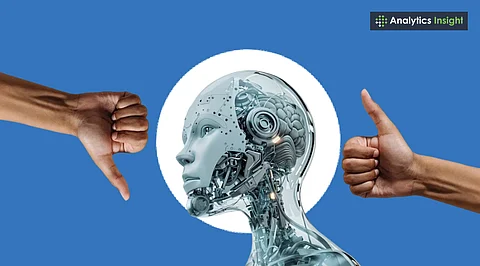

AI increases efficiency but risks job displacement and decision-making opacity.
Ethical concerns include bias, surveillance, and environmental impact.
The future of AI depends on human-led regulation and oversight.
Artificial Intelligence (AI), once seen only in sci-fi storyboards, is now infused into everyday life, as well as virtual assistants, healthcare diagnostics, and fraud detection software. With more intelligent machines being made, difficult questions are being raised: Is AI in service to humanity or acting against it? Are we innovating responsibly, or are we losing control?
Therefore, let’s jump into the opportunities and months AI offers through an evidence-based and impact-driven lens.
Fundamentally, AI is a tool for optimization and automation. Algorithms can analyze data more quickly than humans, accurately model outcomes, and work without rest.
AI regulation optimizes supply chains, anticipates consumer demand, and identifies real-time anomalies in commerce.
In medicine, machine learning helps detect cancers early, track mental health trends, and even conduct robotic procedures.
Adaptive learning platforms customize content to the student’s pace and skill in schooling.
A McKinsey Global Institute study predicts AI can add $13 trillion in output to the global economy by 2030. The NASSCOM estimates the AI sector in India alone will hit Rs. 1.5 lakh crore by 2027.
In certain areas, especially in fields requiring life-or-death decisions, the AI systems deliver results with little or no explanation for their working:
Criminal Justice, wherein some codes proven to be biased are allowed to determine sentencing.
Recruitment, where computerized applicant filters will filter out the suitably qualified ones based on unbalanced training data.
Finance, where HFT (High-frequency-trading) algorithms trigger flash crashes.
The issue is not then one of accuracy but accountability.
The most significant concern is job automation and replacement. The World Economic Forum predicts that 85 million jobs could be taken over by AI in 2025. Yet it expects 97 million new positions to arise, particularly in monitoring AI, prompt engineering, and AI ethics.
Industries most vulnerable to replacement are:
Manufacturing
Customer service
Transport & logistics
Experts advise policymakers to invest in reskilling initiatives, responsible AI development, and human-AI collaboration to avert large-scale job losses.
Also Read: Miracle Pregnancy: AI Helps Couple Conceive After 19 Years of Trying IVF
AI is not immune to its developers’ prejudices. When exposed to past data, AI systems might replicate social biases, ranging from racial profiling in facial recognition to gender bias in credit ratings.
Additionally, as deepfakes, voice cloning, and AI-facilitated disinformation have become more prevalent, new types of political manipulation and fraud are on the horizon. In a recent instance reported in Australia, AI-created content mimicked a state’s premier, emphasizing the danger to democratic institutions.
Lacking robust governance systems, AI could be a means of control and surveillance, not empowerment.
The environmental footprints of AI remain yet another untold story of an overlooked cost. Training huge language models like GPT or Gemini needs millions of kilowatt-hours of electricity and emits considerable amounts of CO₂.
A study from the University of Massachusetts reports that training one large AI model can emit carbon equivalent to five cars over their lifetimes. AI can help in climate modeling and disaster response, yet its sustainability remains questionable.
Also Read: YouTube’s New AI System Flags Underage Users, Even if They Lie About Age
Here’s a quick comparative look at AI’s impact across major domains:
The areas where AI acceleration must face a slowdown include human oversight, international regulations, and ethical design. A global safety charter for AI, akin to climate agreements, is being proposed at the UN. Meanwhile, even leading agencies such as OpenAI and Google DeepMind continue to stress the importance of pragmatic guardrails and red lines.
Thus, India’s Draft National AI Strategy, designed for ‘AI for All,’ emphasizes inclusion, transparency, and sustainability; meanwhile, implementation is sparse.
The real challenge is not whether AI will be good or bad, but whether we can guide it well. History demonstrates that technology does not mold society; instead, people do.
1. What is Artificial Intelligence (AI)?
AI refers to machines or software that can mimic human intelligence—like learning, problem-solving, and decision-making—often using algorithms, data, and neural networks.
2. How does AI affect jobs?
AI automates routine tasks, which may displace some jobs, but it also creates new roles in tech, data science, and AI oversight, requiring upskilling.
3. Can AI be biased?
Yes. AI systems can inherit biases from the data they're trained on, leading to unfair outcomes in hiring, policing, and financial decisions if not properly regulated.
4. Is AI safe to use?
AI is generally safe when designed and monitored responsibly, but risks like misuse, privacy breaches, and black-box decisions remain concerns without proper safeguards.
5. How can AI benefit society?
AI improves healthcare, education, disaster response, and efficiency across industries. It enhances decision-making and accessibility, especially for people with disabilities or limited resources.
